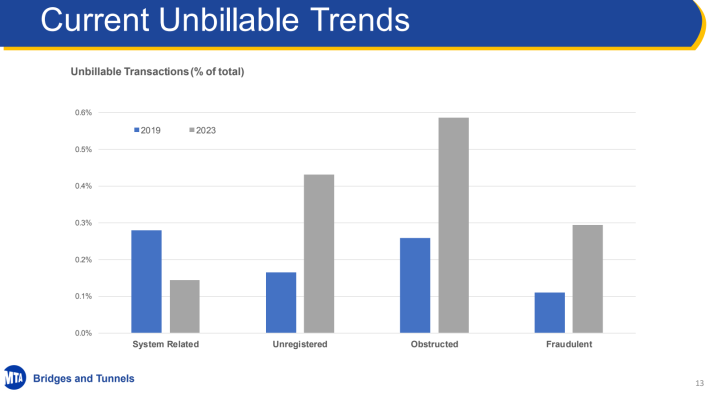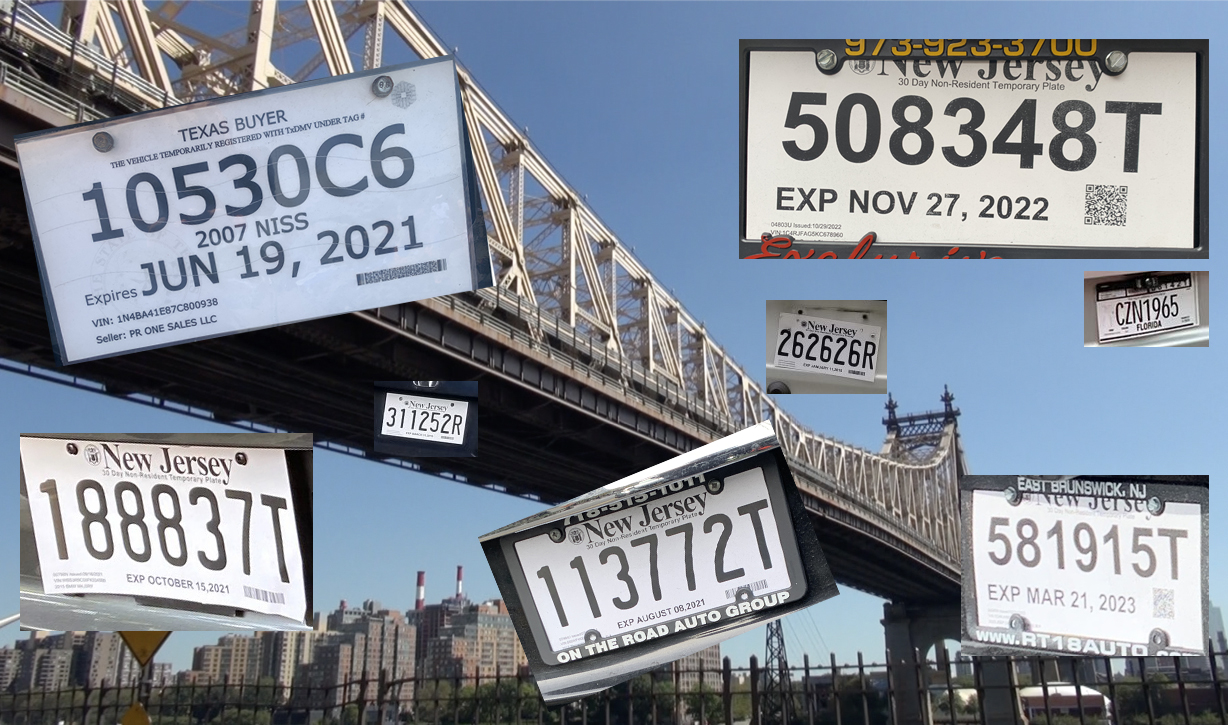Toll evasion at MTA bridges and tunnels is soaring in three fraud-based categories, highlighting the challenges the MTA will face as it gets closer to flipping the switch on congestion pricing in June.
In a presentation to the MTA Board on Wednesday, MTA Bridges and Tunnels President Cathy Sheridan showed that the number of unregistered vehicles, and vehicles with either covered up or fake license plates evading the tolls rose in 2023 compared to 2019.
Sheridan's presentation said about 1.5 percent of the cars that passed through the MTA's bridges and tunnels in 2023 had unbillable license plates. But the numbers are alarming: Cars with obstructed plates rose from just under 0.3 percent of cars to almost 0.6 percent (an increase of 100 percent), the number of fake license plates leaped from about 0.1 percent to 0.3 percent (an increase of 200 percent) and the number of completely unregistered cars increased from under 0.2 percent to over 0.4 percent (an increase of 100 percent).

In raw numbers, the MTA is dealing with millions of additional toll evaders since 2019. That year, the agency processed 292,414,339 toll transactions, 482,491 of which couldn't go through because license plates weren't attached to a name or address at a state DMV; 759,134 couldn't be billed because the license plates were obstructed or blocked, and 323,565 were temporary tags or otherwise fraudulent license plates.
That comes to only 0.5 percent of tolls that could not be billed — though it does amount to more than $10 million.
By 2023, the MTA processed 335,611,579 transactions at its bridges and tunnels: 1,447,304 of those couldn't go through because license plates weren't attached to a name or address; 1,971,695 couldn't because the license plate was obscured or blocked and 988,218 were temporary tags or otherwise fraudulent license plates.
That adds up to 1.3 percent now, or a 160-percent increase from the pre-pandemic norm, before the city was awash in fake plates. The missing money is now roughly $50 million, according to Sheridan.
It's likely that when the new $15 congestion toll begins, drivers will get more ambitious and aggressive about dodging tolls. Given that congestion pricing must, by state law, raise $1 billion, a 1.5-percent hit to toll collections would cost the MTA $15 million. That's more than couch cushion money.
The MTA is of course not the only agency dealing with problems wrought by covered up or fake license plates. Port Authority Executive Director Rick Cotton recently said that about 1 or 2 percent of license plates coming through his agency's toll facilities are unreadable, which is a higher number than the authority predicted it would be dealing with. And according to the city Comptroller's office, the number of city speed cameras that could not be read because a reckless driver had a temp tag (real or fake) or no license plate at all rose by 5,356 percent between 2019 and mid-2023.
To combat the spike in toll evasion, MTA leadership is backing Gov. Hochul's proposal to redefine toll evasion as theft of service — classifying it the same as fare evasion on transit, which makes a suspect subject to arrest. Currently, toll evasion not considered a theft-of-service crime, and a driver doesn't even have his car's registration suspended until he racks up three or more toll violations in a five-year period.
If Hochul's proposal this year sounds familiar, it's because the governor tried to make toll evasion a more serious crime in the 2022, and her predecessor attempted to raise the stakes in 2020 and 2021. Each time it's been proposed, state legislators have shot it down.
MTA Chairman and CEO Janno Lieber thinks things will be different this year for some reason.
"I'm really optimistic that dealing with these potential scofflaws is an issue that has real legislative support," Lieber said on Wednesday. "People understand that they're stealing from everybody else when they engage in these these kinds of total evasion schemes, covered plates, mangling the plate and so on."






